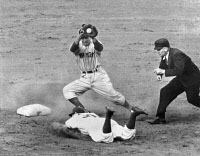|
Pivotal World Series Plays
Lavagetto the Spoiler
1947 World Series Game 4: New York Yankees @ Brooklyn Dodgers
30-year-old Bill Bevens, a strapping 6-3 215lb righthander, had an outstanding season with the Yankees in 1946, his third with the club. He won 16 and lost 13 with a 2.23 ERA, completing 18 of the 31 games he started. Big Bill was the Yanks' second starter behind Spud Chandler (20-8, 2.10).
But he was not as successful in '47. He went from 120 strikeouts and 78 walks in '46 to only 77 strikeouts against 77 walks. His ERA ballooned to 3.82. He lost the same number of games, 13, as in '46 but won only seven.
Nevertheless, Bevens, "the 29-year-old giant from Oregon," was manager Bucky Harris's choice to start Game 4 of the 1947 World Series with the Yankees leading two games to one.
Nothing in Bill's past would have enabled anyone to predict what would happen that sunny day in Brooklyn.
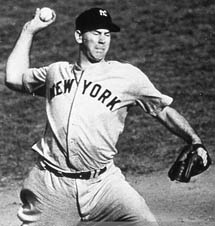 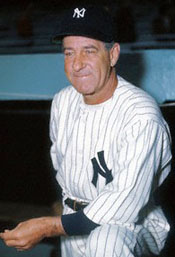 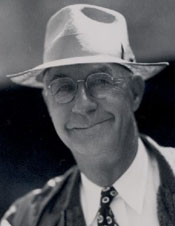 L-R: Bill Bevens, Bucky Harris, Bert Shotton With two outs in the bottom of the ninth, Bevens stood on the mound at Ebbets Field within one out of baseball immortality. He had not allowed a hit to the National League champions. They did plate a run in the fifth inning on two walks, a sacrifice, and a ground out. The Yanks led 2-1 thanks to a bases loaded walk to Joe DiMaggio in the first and a triple by 3B Billy Johnson followed by a double by RF Johnny Lindell in the fourth.
Bevens' performance was even more amazing than anyone knew at the time. He had hurt his arm early in the game and lost some speed off his fastball. But he felt he could get one more out.
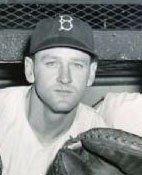 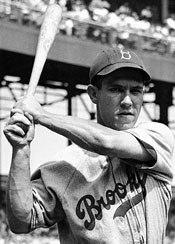 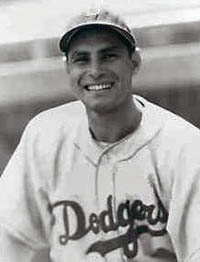 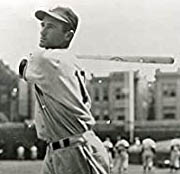 L-R: Bruce Edwards, Pete Reiser, Al Gionfriddo, Spider Jorgensen C Bruce Edwards had led off the ninth by flying out to deep LF.
RF Carl Furillo drew the ninth base on balls that Bill had issued - tying a World Series record. "He was wild, but he had great stuff," said rookie C Yogi Berra.
3B Spider Jorgensen fouled to 1B George McQuinn. One out to go.
Brooklyn manager Bert Shotton sent up Pete Reiser to pinch hit for P Hugh Casey and put in Al Gionfriddo to run for Furillo at first base.
Reiser was a "five tool" player. But he had a propensity for running into unpadded outfield walls. His latest encounter with the immovable object occurred on June 5, 1947 when he made a great catch at Ebbets Field and crashed into the center field wall. He was carried off the field on a stretcher, and a priest administered the last rites of the Catholic Church before he was transferred to a hospital. He couldn't move for eight days. He was eventually operated on for a blood clot in his skull. He rejoined the club in August but had to be carried off the field after making a diving catch when he was unable to recognize anyone.
He was still having dizzy spells when the World Series began. In Game 3, he felt his ankle snap while trying to steal second. Back at the hospital, a doctor said he had a broken ankle and wanted to put a cast on it. Pete asked that he simply tape it to allow him to return to the Dodgers for the rest of the series.
Lavagetto was a 35-year-old veteran in his tenth season in the majors plus four years of service in the military. The Dodgers offered him a minor league managing job for the 1947 season, but he thought he could play another season in the big leagues. He wwas used mostly as a pinch-hitter, hitting .261 in that role.
Stanky drew 103 walks during the season, but Shotton wanted more pop. Lavagetto was as surprised as anyone that his manager called on him at this clutch moment. In fact, when he heard his name called, he assumed he was going to pinch run and started toward first base before Shotton told him he was pinch-hitting. "So when I went up there to pinch-hit against Bevens," recalled Cookie, "it was something I had been used to doing all year." By now, Bevens had thrown more than 140 pitches. But the Yankee scouting report on the right-hand-batting Lavagetto said you could get him out with fastballs away. So Berra put one finger down to indicate a fastball and waggled his hand to indicate high and away. Bevens threw the pitch right past Cookie on the outside corner for strike one. So Yogi gave the same signal, but this time Lavagetto got good wood on the ball and sent it soaring high into right field. It hit off the screen atop the 38' high fence and dropped straight down at the feet of RF Tommy Henrich. Off at the crack of the bat with two outs, Gionfriddo scored the tying run easily, and Miksis slid across with the winning run just before the relay arrived. The Dodgers and many fans mobbed Lavagetto in the center of the diamond. The new hero needed a police escort to make it to the dugout.
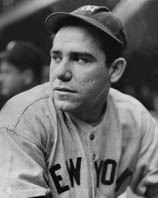 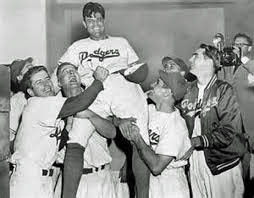 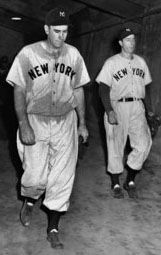 L-R: Yogi Berra in 1947, Lavagetto triumphant and Bevens disconsolate. Cookie later revealed that the Yankee "book" on him was wrong. "Fast and tight was the way to handle me. High and outside was just where I like them."
As Big Bill left the field, he started crying. In the clubhouse, Yogi sobbed with him.
Harris stood by his decision to walk Reiser. "I ordered him put on - yes - and I'd do the same thing tomorrow." Bucky did do the "same thing tomorrow." Reiser pinch hit in the bottom of the 7th of Game 5. The Yankees led 2-1, and the Dodgers had runners on third and second with two outs. Harris ordered Spec Shea to walk Pete intentionally. Miksis again ran for the hobbled outfielder. This time, the next hitter, Pee Wee Reese struck out looking. Shea retired the Dodgers in the eighth and ninth to preserve the crucial 2-1 win.
Bevens gained redemption when he hurled 2 2/3 scoreless innings in the Yankees' 5-2 victory in the seventh game.
Bill never threw another pitch in a major league game after the 1947 World Series, and Lavagetto retired after the season. |
